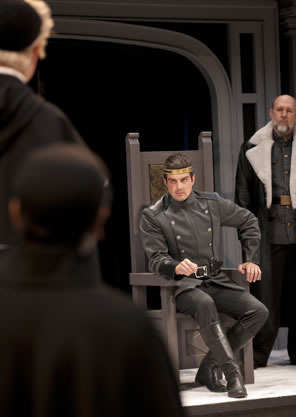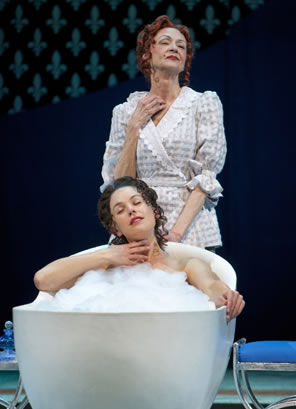Henry V
Henry’s Winning Campaigns
In War and Politics
Oregon Shakespeare Festival, Elizabeth Stage/Allen Pavilion, Ashland, Ore.
Thursday, August 16, 2012, G–33&35 (center orchestra)
Directed by Joseph Haj
On the evening of the day we saw Shakespeare’s supposed anti-war play, Troilus and Cressida, at the Oregon Shakespeare Festival, we saw his supposed pro-war play, Henry V. Seeing these productions back-to-back, with Troilus set in modern Iraq and Henry mingling modern dress with historic costumes, neither play seems particularly anti or pro. Both are insightful portrayals of war in all its dimensions, from the glory to the gory, from the horror to the honor.

Henry V (John Tufts), Westmoreland (Russell Lloyd) and the English court. Photo by T. Charles Erickson, Oregon Shakespeare Festival.
In this particular Henry V, I saw more kinship with another production running this year at OSF: All the Way, the new play about Lyndon B. Johnson’s first year as U.S. president. Perhaps this was solely my frame of mind in this election year and not that of director Joseph Haj, but I saw this Henry waging a political campaign as much as he was waging a military one.
John Tufts, continuing in the role of Hal from the past two OSF seasons’ productions of the two parts of Henry IV, is a commanding King Henry, not only as the character but also in his acting skills. We didn’t have the benefit of seeing his Prince Hal, so I can’t comment on this Henry’s particular back story—or how he got that Frankenstein-like scar etched on his right cheek (courtesy of Hotspur, I suspect). That scar gives a presupposed regard of him as a warrior totally contrary to the memory of him as a truant prince—I’d have to think that if he saw Henry in person, the Dauphin would not have sent him a trunk full of tennis balls. We also don’t see any behavioral hint in the beginning that he was once the sworn brother to all the good lads in Eastcheap; in his first scene, he’s seriously cool, warily hearing out the Archbishop of Canterbury’s argument for attacking France. There’s nothing personable or comfortable in his demeanor; only when the trunk of tennis balls is opened does his veneer crack into a smile—a knowing smile. The military campaign thus begins, but I suspect his political campaign to win control over both England and France had already begun.
The military campaign is well recorded (and, I should say, superbly staged in this production). So let’s track the political campaign, instead. In the opening scene, Canterbury (Richard Howard) does not know which way the king leans concerning a bill before Parliament to tax the church’s estates, and Henry is undecipherable when he asks for Canterbury’s opinion on the French claim, though he publicly cautions the archbishop to “take heed how you impawn our person.” Tuft's Henry noticeably raises an eyebrow upon hearing that the church will lend financial support to the enterprise, but he holds off publicly committing to action against France until after he hears from the French ambassadors. The Dauphin’s gift of tennis balls is a greater gift to this Henry than the Dauphin would ever understand. With just cause supplied by the Dauphin and the church's financial aid in hand, Henry commits to the war.
Henry's military campaign stumbles along without a clear strategy. "We would not seek a battle, as we are," he tells Montjoy. "Nor, as we are, we say we will not shun it." However, his political campaign gains traction every step of the way. Haj gives Henry ample opportunity to play to various audiences at each step, and Tufts’ Henry astutely reads what role he must play to capture each constituency. He’s a sly trickster with his immediate court, backslapping the traitors at Southampton before turning a vicious visage on them (and in sentencing them to death, he says he does so not for the threat to his person but to the nation). Don’t think any other courtier is going to risk double-crossing him after that. He threatens Harfleur with atrocities during the English siege—the promise of treasure and women certainly would play well to his army—but as soon as Harfleur capitulates he plays the role of conciliator, ordering his army to treat the citizens gently. Henry knows that, for the time being, he has his army’s loyalty; it’s the hearts and minds of the French people he has to win over to ensure winning and keeping their crown. He further demonstrates this aim by having Bardolph (Brent Hinkley) executed for stealing. Except, in this production, Henry doesn’t “have Bardolph executed”; Tufts’ Henry himself strangles his old companion, a coldly efficient act taken out of Tony Soprano’s playbook. Don’t think any other soldier is going to risk violating his orders after that.
Henry solidifies his political base on the eve of Agincourt, renewing the loyalty of his soldiers by, in Tufts’ performance, literally giving them a touch of Harry in the night. After Agincourt, and after ordering all the French prisoners killed, Henry not only credits his victory to God, he insists that his soldiers do, too, thereby establishing his mandate to rule France. In a seemingly superfluous piece of stage business, he interacts with Fluellen and claims to be Welsh. Henry may have been born in Monmouth, but he is not “Welsh”—a ruse politicians use today, too. Even his courtship of Katherine has the appearance of political maneuvering. Yes, it is a charming rom-com scene, and Tufts and especially Brooke Parks play it that way (Parks’ Katherine is intrigued by this Henry, and he also gets solid support in his courting from Judith–Marie Bergan's Alice). But think about it: Henry can have Katherine as his queen whether she loves him or not—it’s an arranged marriage (and part of the treaty terms). However, Henry knows that, as with the French people, he can further tighten his grip on France’s throne by having Katherine as his devoted ally. To win Katherine over, Tufts’ Henry uses excess of humility, notably telling her he cannot woo with words (when wooing everybody else with words has been his forte throughout the play). We’ve seen this humility act before, in Southampton and Agincourt; it appears when he needs it most, and it disappears just as quickly when it no longer serves his purpose. And so it disappears now when the King of France returns and Henry quickly lets go of Katherine and resumes his cool, distanced royal bearing.

Alice (Judith-Marie Bergan) teaches Katherine (Brooke Parks) the English word for neck. Photo by T. Charles Erickson, OSF.
The centerpiece scene of this production is Act IV, Scene 3. “Once more unto the breach” is the more famous speech from this play, but Henry’s St. Crispin’s Day speech—“We few, we happy few, we band of brothers”—is one of Shakespeare’s finest passages. As spoken by Tufts’ Henry, it is a speech on par with “Four score,” “Ask not,” and “I have a dream,”and had me ready to jump up and join his fight. Henry is not only rousing his soldiers to fight against incredibly long odds but psychologically making all his troops, nobility and peasant, feel that they are his brothers. Henry’s a quick learner; his own polling of the troops the night before showed him the need to close the gap between his royal image and the commoner class.
As dominating as Tufts’ Henry is in this production, other performances emerge from a mostly solid cast, including Parks as Katherine and Bergan as both Alice and Hostess Quickly. Jeffrey King is a brute of a Fluellen. Funny with all his pribbles and prabbles and disciplines of war, this Fluellen was also a stouthearted warrior, the kind who shows no hesitation in inserting himself into the king’s conversations. With King’s performance—which grows in prominence as the play transpires—I got to wondering if Shakespeare himself knew that this creation would become so omnipresent by the end of the play as to become the butt of a Henry prank (a scene mercifully cut in this production—Henry directly challenges Michael Williams instead of setting up Fluellen as the challenger). Christine Albright gives the Boy such a winning personality that when he and the other boys are massacred by the French, we feel the anguish and anger that prompts Henry to order the French prisoners killed. Cristofer Jean plays Montjoy as the first person to realize the full measure of Henry—even, perhaps, before the English courtiers do. This Montjoy has no idea that the “gift” from the Dauphin (Daisuke Tsuji) is tennis balls. Suddenly finding himself at the spear tip of the king’s displeasure, Montjoy appreciates not only Henry’s measured reaction and articulately poignant (and pun-filled) response, but also his continuing courtly demeanor.
Kudos, too, to Kelvin Underwood who provided the play’s music on drums and tonal percussion from his aerie above the center of the stage. This lone percussionist could create a soundtrack equal to that of a synthesizer as, on the stage below, King Henry singly composes his own work of military and political art. It is his masterpiece, and Shakespeare’s, and Tufts,’ too.
Eric Minton
August 22, 2012
Comment: e-mail editorial@shakespeareances.com
Start a discussion in the Bardroom



 Find additional Shakespeareances
Find additional Shakespeareances